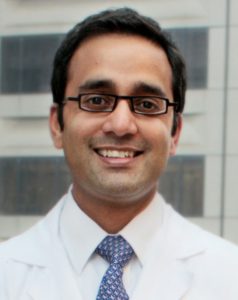
A new study published in New England Journal of Medicine found that an experimental drug did not lower hospitalization among patients suffering from heart failure with preserved ejection fraction, a common form of heart failure.
The study, based on a large clinical trial known as PARAGON, did suggest, however, that the drug may have some benefits particularly in women, a finding that merits further investigation, according to Sanjiv Shah, ’00 MD, the Neil J. Stone, MD, Professor of Medicine in the Division of Cardiology, a co-author of the study and a U.S. National Leader for the trial.
“PARAGON narrowly missed its primary endpoint but did appear to show a possible benefit in heart failure with preserved ejection fraction, particularly with regards to reducing heart failure hospitalizations and improving quality of life,” said Shah. “The data are not definitive, but it appears that women in particular benefit, and I am particularly intrigued by this finding.”
About half of heart failure cases are classified as reduced ejection fraction, meaning the heart is weak and unable to pump blood effectively. According to Shah, this type of heart failure is caused by direct damage to the heart, such as a heart attack, and is easily diagnosable and familiar to clinicians.
On the other hand, a heart with preserved ejection fraction (HFpEF) is pumping normally but the muscle is abnormally stiff, preventing the heart from filling properly. This type of heart failure, which appears to be associated with abnormalities in other organs in addition to the heart, is more difficult to diagnose using ultrasound, the usual method of diagnosing heart failure.
The proximate cause is often less clear, but cardiovascular risk factors like aging, obesity, a sedentary lifestyle, diabetes and high blood pressure appear to play a major role, according to Shah.
The current trial aimed to reduce the risk of hospitalization among patients aged 50 or older with symptoms of HFpEF. The investigators tested a novel treatment: a neprilysin inhibitor coupled with a blood pressure lowering drug, compared to a blood pressure lowering drug alone. Accordingly, about 2,400 patients received sacubitril–valsartan, while 2,400 patients received just valsartan.
After nearly three years, the trial showed that the new treatment narrowly missed statistical significance in reducing recurrent heart failure hospitalizations compared to valsartan alone.
However, Shah noted that examining different population’s responses to the drug suggested that women may respond better to the drug. Shah said he thought this may be linked to sacubitril, which increases natriuretic peptides, a hormone that helps the body combat heart failure.
“Women in particular have low natriuretic peptides and post-menopause are particularly vulnerable to natriuretic peptide deficiency,” Shah said. “The benefit seen in women in the PARAGON trial fits with our scientific knowledge of the natriuretic peptide pathway.”
In addition to the findings of the study, Shah noted that the size of the trial — over 4,800 patients — was an accomplishment. Prior to the establishment of the Northwestern HFpEF program in 2007, HFpEF-specific clinical care programs were few and far between, and enrolling patients in HFpEF clinical trials was very difficult, but the spread of similar programs around the world has made enrolling patients possible, Shah said.
“We developed a natural language processing algorithm that queried the electronic health record in order to improve efficiency in finding patients who were eligible for the PARAGON trial,” Shah said. “We were able to enroll the most patients of any other country, which shows that the U.S. can be a major participant in HFpEF trials.”
This clinical trial was supported by Novartis.






